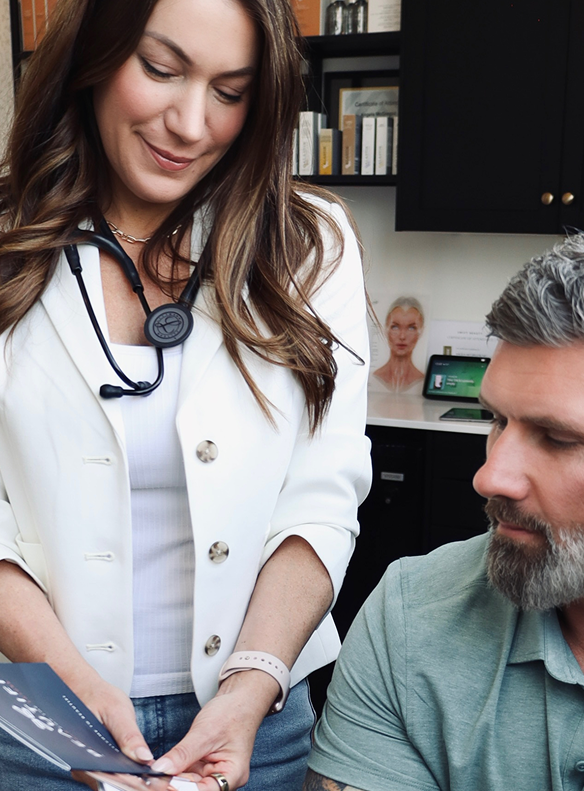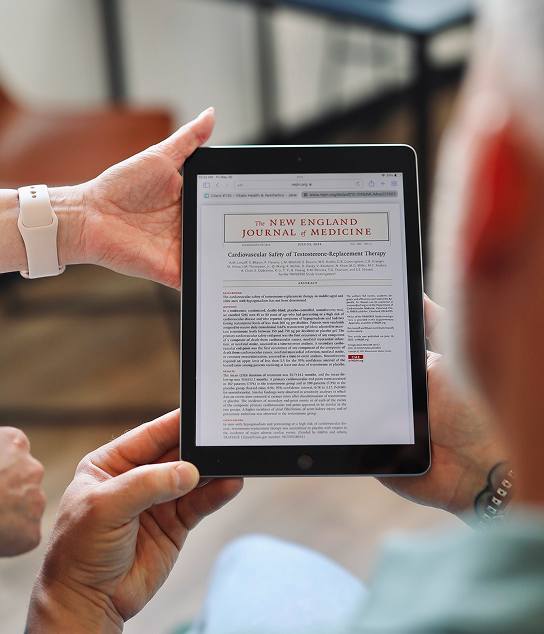
Testosterone Therapy for men who want their strength—and clarity—back
Low testosterone can affect more than your energy. It can impact mood, motivation, sleep, sex drive, and physical performance. Testosterone Replacement Therapy (TRT) is a clinically proven treatment that restores healthy hormone levels, helping men regain strength, clarity, and confidence.
At Vitalis, testosterone therapy is delivered under the care of a Nurse Practitioner with advanced training in hormone optimization. Your treatment is based on lab data, lifestyle, and long-term goals—so you get the right support, for the right reasons.
Why men choose testosterone therapy
Increases Energy & Vitality
Feel more focused, motivated, and physically capable in your day-to-day life.
Supports Muscle Mass & Body Composition
TRT helps rebuild lean muscle and can reduce fat accumulation, especially around the midsection.
Boosts Libido & Sexual Function
Restores sex drive and performance by addressing one of the most common causes of decline: hormonal imbalance.
Improves Mood & Mental Clarity
Many men report sharper thinking, fewer mood swings, and a greater sense of well-being.
How Testosterone Therapy Works
After lab testing and a full medical evaluation, TRT is prescribed if testosterone levels are clinically low and symptoms are present. The goal is not to “boost” testosterone unnaturally, but to restore it to a level that supports healthy function and quality of life. Testosterone can be administered in several forms, including:
- Topical creams
- Intramuscular injections
- Oral or sublingual tablets
At Vitalis, we’ll discuss the method that best suits your lifestyle, comfort, and long-term treatment goals.



Understanding Testosterone & Aging
Testosterone is the primary male sex hormone responsible for muscle mass, bone density, sex drive, and mood regulation. While natural testosterone levels begin to decline around age 30, some men experience more significant drops that lead to a condition called hypogonadism.
Symptoms of low testosterone can include:
- Decreased libido
- Fatigue and low stamina
- Irritability or depression
- Difficulty concentrating
- Reduced muscle mass
- Increased body fat
- Sleep disruption
- Low motivation
Testosterone therapy may help you with
- Sex drive and performance
- Muscle mass and strength
- Cognitive clarity and mood
- Body composition (fat loss)
- Energy and stamina
- Motivation and overall well-being
Monitoring & Follow-Up
TRT is a long-term therapy that requires routine monitoring to ensure effectiveness and safety. At Vitalis, regular follow-up visits include:
- Blood work to track hormone levels
- Assessment of physical and emotional changes
- Adjustments to dosing or delivery method as needed
- Screening for any potential side effects
We prioritize a data-driven, patient-first approach—because
hormone therapy should be empowering, not risky or unpredictable.
What does it include?
At Vitalis Health & Aesthetics, our testosterone programs offer an all-encompassing approach to restoring sex drive, performance, muscle mass, strength, and clarity. Each plan is customized to your unique needs and supported with ongoing medical care — because your hormones deserve more than a prescription.
- Comprehensive health assessment and medication review
- Detailed lab testing and interpretation
- Customized bioidentical hormone treatment plan
- Four follow-up visits per year to assess progress and adjust dosing
- Ongoing support with nutrition, exercise, and supplement guidance
- Motivation and overall well-being
This is a true partnership in your long-term wellness — guided by medical expertise, compassion, and evidence-based care.
Your investment
BHRT Programs: Start at $1,475 per year
Includes your initial consultation, lab review, treatment plan, and ongoing follow-up care.
Prescription costs are billed separately.
Additional programs and memberships are available for clients seeking enhanced perks and concierge-level service.
Ask us about our Premier Membership options, designed for those who want a more personalized, high-touch experience with added benefits throughout the year.
Feel balanced. Feel like yourself again.
Frequently Asked Questions
How do I know if I have low testosterone?
Symptoms like low energy, poor concentration, reduced libido, and increased body fat may indicate low testosterone. A blood test is required to confirm diagnosis.
Is testosterone therapy safe?
TRT is safe when prescribed and monitored by a qualified healthcare provider. Ongoing assessments ensure hormone levels remain within healthy, therapeutic ranges.
How soon will I notice changes?
Many men begin to notice improvements in energy, mood, and libido within a few weeks. Muscle and body composition changes often follow over the next 2–3 months.
Can TRT affect fertility?
Yes. TRT can reduce sperm production, so it may not be recommended if you’re trying to conceive. There are alternative approaches to testosterone support in those cases.
Does testosterone therapy cause aggression or mood swings?
No—when dosed appropriately, TRT often reduces irritability and stabilizes mood. Side effects are rare with responsible prescribing and follow-up.
Does testosterone raise cholesterol levels in men and cause heart disease?
Synthetic testosterone raises overall cholesterol and lowers good cholesterol (HDL) levels. Micronized testosterone (bioidentical) will lower cholesterol and raise HDL. This protects against cardiovascular disease, high blood pressure, and lowers insulin resistance.
Will I need to stay on TRT forever?
Not necessarily. Some men use TRT as a short- to medium-term intervention. Others continue long-term with regular monitoring. Your treatment plan will be personalized to your health goals and response.
Not just about testosterone—about taking control of how you feel.
At Vitalis, testosterone therapy is never rushed or standardized. We take the time to understand your history, your goals, and how you want to feel—because optimized health starts with a plan that actually fits your life.